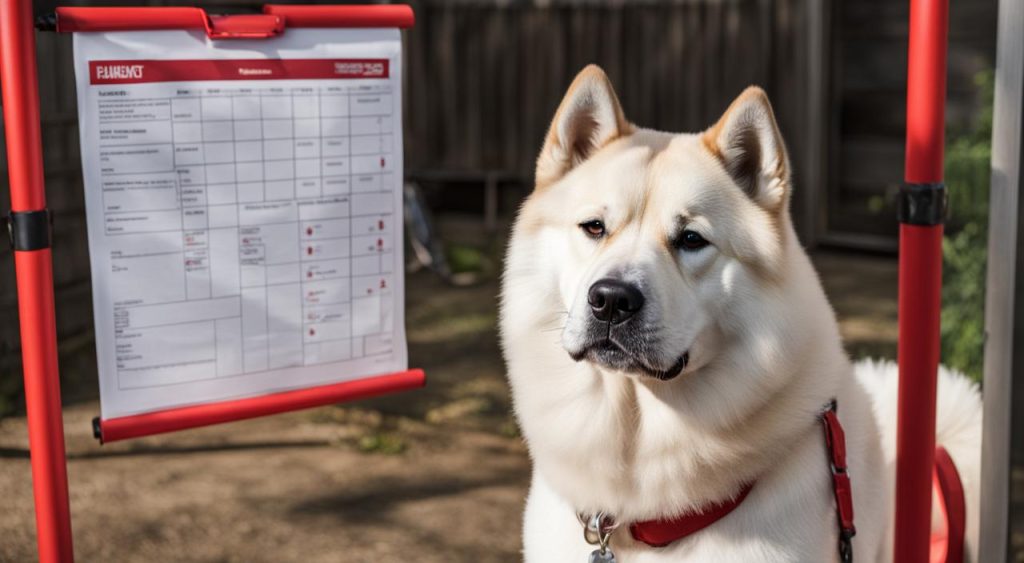Akitas are a breed known for their loyalty and protectiveness. They make wonderful companions and are generally healthy dogs with an average lifespan of 12-15 years. However, like all breeds, Akitas can be prone to certain health issues that owners should be aware of.
Common health problems in Akitas include hypothyroidism and hip dysplasia. Hypothyroidism is a condition where the body doesn’t produce enough thyroid hormone, which can lead to weight gain, lethargy, and skin problems. Hip dysplasia, on the other hand, affects the hip joints and can cause lameness and pain.
It’s important for Akita owners to understand these potential health concerns and take steps to manage and prevent them. Regular check-ups with a veterinarian can help detect any issues early on, allowing for prompt intervention. Proper nutrition, exercise, and grooming are also vital for maintaining an Akita’s overall health and well-being.
Key Takeaways:
- Akitas are generally healthy dogs with an average lifespan of 12-15 years.
- Common health issues in Akitas include hypothyroidism and hip dysplasia.
- Regular veterinary check-ups and screenings are important for early detection of health problems.
- Proper nutrition, exercise, and grooming are essential for maintaining an Akita’s overall health.
- Working closely with a veterinarian can help manage and prevent potential health issues in Akitas.
Common Health Issues in Akitas
Akitas, like any other breed, can be prone to certain health conditions. It’s important to be aware of these common health risks and take proactive measures to manage and prevent them. Some of the most prevalent health issues in the Akita breed include:
1. Hip Dysplasia
Hip dysplasia is a common health condition that affects Akitas. It refers to an abnormal development of the hip joint, which can lead to discomfort, lameness, and arthritis. Regular exercise and maintaining a healthy weight can help reduce the risk of hip dysplasia in Akitas.
2. Hypothyroidism
Akitas are also prone to hypothyroidism, a disorder where the thyroid gland doesn’t produce enough hormone. This can result in weight gain, fatigue, and skin problems. Regular monitoring of thyroid hormone levels and medication can help manage this condition.
3. Bloat
Bloat, or gastric dilatation-volvulus, is a serious and potentially life-threatening condition that can occur in Akitas. It involves the stomach becoming distended and twisted, leading to poor blood flow and potentially organ damage. Feeding multiple small meals throughout the day and avoiding vigorous exercise after meals can help prevent bloat.
4. Thyroid Problems
In addition to hypothyroidism, Akitas may also experience other thyroid problems, including autoimmune thyroiditis. Regular thyroid testing can help detect and manage these issues.
5. Cancer
Cancer is a significant concern in Akitas, with some of the most common types being lymphoma, osteosarcoma, and hemangiosarcoma. Regular check-ups, early detection, and cancer screenings are crucial for detecting and treating cancer in its early stages.
6. Bone and Joint Problems
Because of their size and structure, Akitas are prone to bone and joint problems such as arthritis and elbow dysplasia. Joint supplements, controlled exercise, and good nutrition can help support joint health and minimize the risk of these conditions.
It’s important for Akita owners to work closely with their veterinarian to monitor and manage these health conditions. Regular check-ups, preventive care, and early intervention can greatly improve the overall health and well-being of Akitas.
Managing Health Issues in Akitas
As an Akita owner, it’s essential to take proactive steps to manage and prevent health issues in your beloved dog. By following these guidelines, you can help ensure that your Akita leads a long and healthy life.
Regular Veterinary Check-ups: Regular check-ups and screenings are crucial for detecting any potential health issues early on. Your veterinarian will be able to monitor your Akita’s overall health and provide appropriate guidance for managing any emerging concerns.
Management of Specific Conditions: Some health issues in Akitas, such as hip dysplasia or hypothyroidism, may require specific management strategies. Your veterinarian may recommend medication, surgery, or specialized treatments to help manage these conditions effectively.
Weight Management: Maintaining a healthy weight is vital for preventing certain health problems in Akitas. Your veterinarian can provide guidance on appropriate diet and exercise routines to ensure your dog stays at an optimal weight.
Dental Care, Parasite Prevention, and Grooming: Good dental hygiene, regular parasite prevention, and proper grooming practices are essential for your Akita’s overall health. Regular brushing, routine parasite treatments, and professional grooming sessions can help prevent common health issues and keep your dog’s coat and skin in excellent condition.
By staying proactive and working closely with your veterinarian, you can effectively manage and prevent health issues in your Akita. Remember, your dedication to your dog’s health and well-being plays a crucial role in ensuring a happy and healthy life for your beloved companion.
Conclusion
Understanding Akita health is crucial for every Akita owner. While Akitas are generally healthy dogs, it is important to be aware of the potential health risks associated with this breed. By taking appropriate measures, you can help ensure that your Akita lives a happy and healthy life.
Regular veterinary care is essential for maintaining your Akita’s health. Schedule routine check-ups to monitor their overall well-being and detect any potential issues early on. Your veterinarian can also provide guidance regarding vaccinations, parasite prevention, and any specific health concerns that may be common in Akitas.
In addition to regular veterinary care, providing your Akita with a balanced and nutritious diet is key. Consult your veterinarian to determine the best diet for your dog’s specific needs. Make sure to follow portion control guidelines and avoid overfeeding, as obesity can contribute to various health problems.
Exercise and physical activity are vital for an Akita’s physical and mental well-being. Regular exercise helps to manage weight, strengthen muscles, and keep your Akita active and engaged. Whether it’s daily walks, playtime at the park, or structured training sessions, be sure to provide ample opportunities for your Akita to stay active.
Grooming also plays a role in maintaining your Akita’s health. Brushing their coat regularly helps to remove loose hairs and prevent matting. Pay attention to their ears, teeth, and nails as well, and maintain good dental hygiene by brushing their teeth regularly.
By understanding the Akita health profile and implementing these measures, you can help ensure that your beloved Akita companion enjoys a long and healthy life by your side.





